Introduction
Thinking about hiring developers in India? You’re not alone. With its vast talent pool, cost efficiency, and expertise in cutting-edge technologies, India has become a top destination for businesses worldwide. But let’s be honest—navigating the hiring process can feel overwhelming. Where do you start? How do you find the right talent? And what about cultural differences or legal considerations? Don’t worry; we’ve got you covered. In this guide, we’ll walk you through everything you need to know to hire the best developers in India—without the stress.
Key Sections to Include
- Why Choose India for Hiring Developers?
- Benefits of Hiring Developers in India
- Challenges of Hiring Developers in India
- Best Practices for Hiring Indian Developers
- How to Identify the Right Developer for Your Project
- Hiring Models and its Costs
- Relevant Statistics and Trends in India’s Tech Industry
- Legal and Contractual Considerations
- Cultural Nuances to Keep in Mind
- Case Studies
Why Choose India for Hiring Developers?
India isn’t just a hub for IT talent—it’s a powerhouse of innovation. Here’s why businesses worldwide are turning to Indian developers:
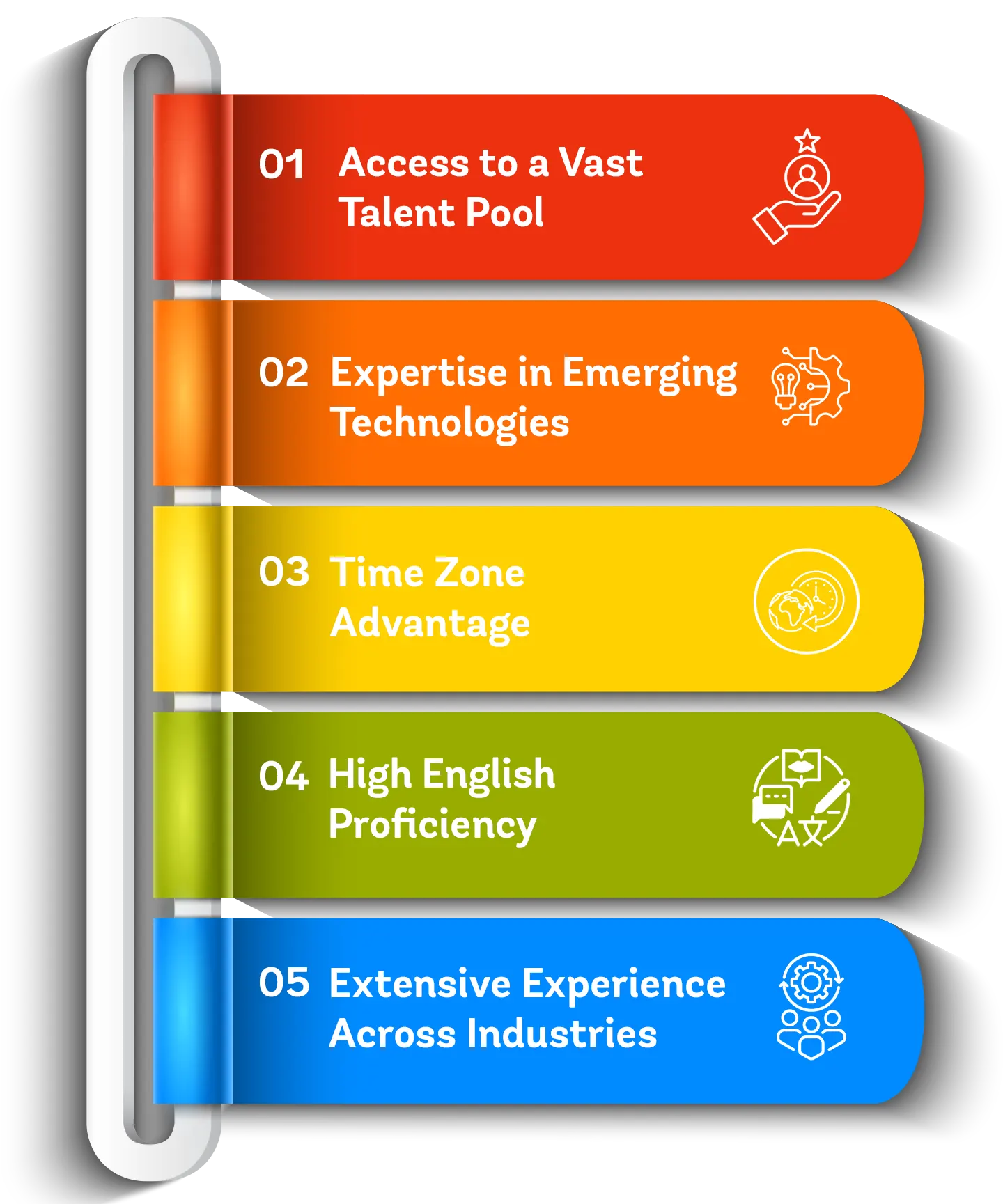
1. Access to a Vast Talent Pool
India has one of the largest and most talented IT workforces in the world. Every year, thousands of highly skilled developers graduate from top universities, bringing expertise in a wide range of programming languages, frameworks, and technologies.
2. Expertise in Emerging Technologies
India has one of the largest and most talented IT workforces in the world. Every year, thousands of highly skilled developers graduate from top universities, bringing expertise in a wide range of programming languages, frameworks, and technologies.
3. Time Zone Advantage
India’s time zone provides a strategic advantage for businesses in the US, UK, and Europe, enabling seamless collaboration. This allows companies to maintain 24/7 operations and achieve faster project turnaround times.a.
4. High English Proficiency
With a strong command of English, Indian developers communicate effectively, eliminating language barriers and ensuring seamless collaboration.
5. Extensive Experience Across Industries
Indian developers bring extensive experience across industries like healthcare, finance, e-commerce, and gaming. Their diverse expertise allows them to understand the unique challenges and requirements of different business domains.
Benefits of Hiring Developers in India

India has become a global hub for IT and software development, making it a top choice for businesses looking to hire skilled developers. Beyond cost savings, companies benefit from India’s deep expertise, efficiency, and culture of innovation.
1. Cost-Effective Solutions
Hiring developers in India offers a significant cost advantage without compromising quality. Lower living expenses compared to Western countries allow businesses to reduce operational costs while still receiving top-tier development services.
2. Flexible Hiring Options
India provides a range of hiring models to suit different business needs. Whether you require a dedicated team for a long-term project or freelance developers for short-term tasks, you can easily scale your team up or down based on project demands.
3. Dependable and Hardworking Professionals
Indian developers are recognized for their strong work ethic, dedication, and commitment to deadlines. Their reliability ensures projects are delivered on time while maintaining high-quality standards.
4. Commitment to Quality Assurance
Indian developers and IT firms prioritize rigorous quality assurance processes, ensuring that the final product is secure, bug-free, and aligned with global industry standards.
Challenges of Hiring Developers in India
While hiring developers in India offers significant advantages, it’s important to be aware of potential challenges to ensure a smooth hiring process and successful collaboration. Here are some common hurdles businesses may encounter and how to address them:

1. Finding the Right Talent
India’s vast talent pool is an advantage, but it can also make the hiring process overwhelming. Identifying candidates with the right skills and experience requires a strategic approach, including well-defined job descriptions, rigorous screening, and structured interviews.
2. Variations in Skill Levels
Although India is home to many highly skilled developers, expertise can vary widely. To ensure you hire the right talent, conduct technical assessments, coding tests, and real-world problem-solving exercises to evaluate candidates’ proficiency.
3. Cultural and Work Style Differences
Differences in work styles, communication preferences, and decision-making approaches can sometimes lead to misunderstandings. Building cultural awareness, setting clear expectations, and fostering open communication help bridge these gaps and create a productive work environment.
4. Retention and Talent Competition
The demand for skilled developers in India is high, leading to a competitive job market. To improve retention, companies should offer competitive salaries, professional growth opportunities, and a positive work culture that encourages long-term commitment.
5. Managing Expectations and Communication
Misaligned expectations regarding project timelines, deliverables, and goals can create challenges. Clearly defining objectives, setting milestones, and maintaining regular communication ensure that everyone stays aligned throughout the project.
By recognizing these challenges and implementing proactive solutions, businesses can successfully collaborate with Indian developers and leverage their expertise to drive innovation and growth.
Best Practices for Hiring Indian Developers
Hiring Indian developers can be a game-changer, providing access to top talent and cost-effective solutions. However, to ensure a smooth hiring process and a successful collaboration, businesses should follow these best practices:
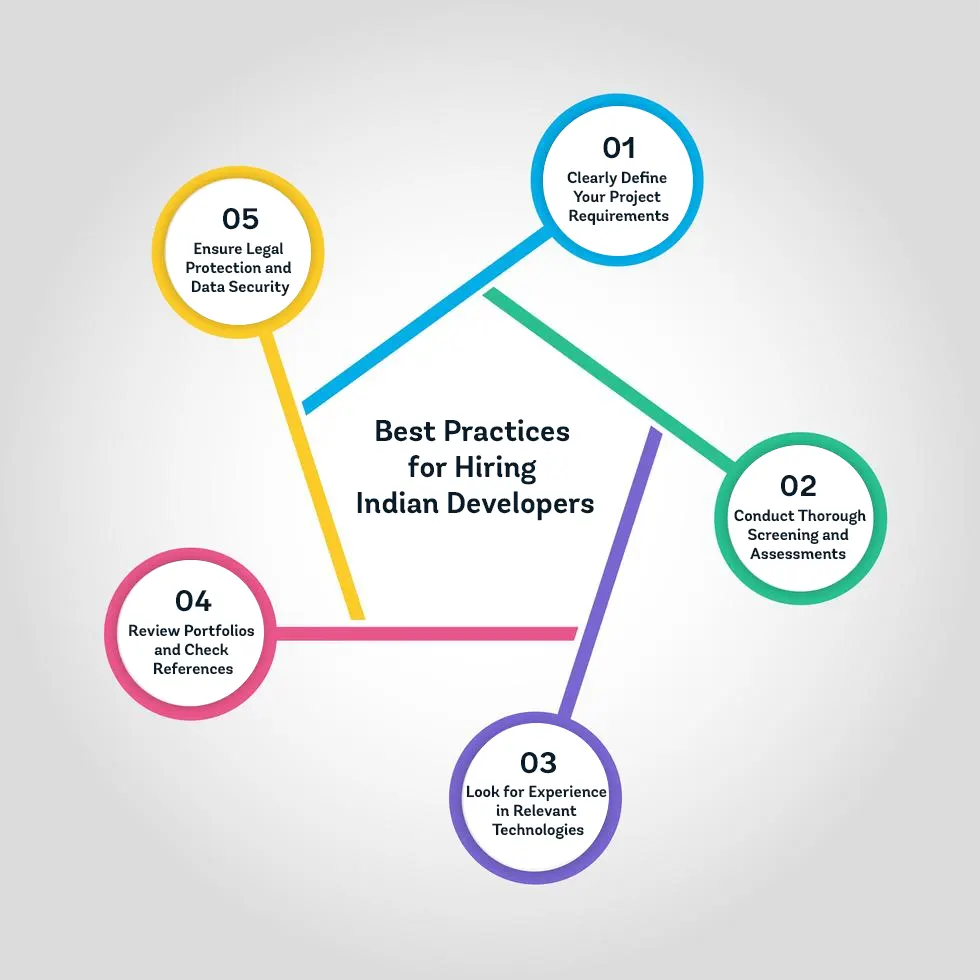
1. Clearly Define Your Project Requirements
Before starting the hiring process, outline your project’s scope, objectives, timelines, and technical needs. Having a clear roadmap helps you find developers with the right skills and experience to meet your specific requirements.
2. Conduct Thorough Screening and Assessments
Evaluate candidates through coding tests, real-world problem-solving exercises, or live coding sessions. In addition to technical expertise, assess soft skills like communication, adaptability, and teamwork to ensure a good cultural fit.
3. Look for Experience in Relevant Technologies
Hire developers with proven expertise in the technologies your project requires. Whether it’s Python, JavaScript, AI, or DevOps, their proficiency in your tech stack will be crucial for delivering high-quality results.
4. Review Portfolios and Check References
Examine previous projects and request references to assess the quality and reliability of a developer’s work. A strong portfolio offers valuable insights into their technical capabilities and experience handling complex projects.
5. Ensure Legal Protection and Data Security
Safeguard your intellectual property and confidential information with clear legal agreements. Use NDAs (Non-Disclosure Agreements) and well-defined contracts to protect sensitive data and establish secure working terms.
By following these best practices, businesses can build a skilled and reliable development team in India, ensuring successful projects and long-term collaboration.
How to Identify the Right Developer for Your Project
Choosing the right developer is a key factor in your project’s success. It’s not just about technical skills—it’s about finding someone who aligns with your goals, thinks critically, and adapts to challenges. Here’s how to identify the best fit for your needs:
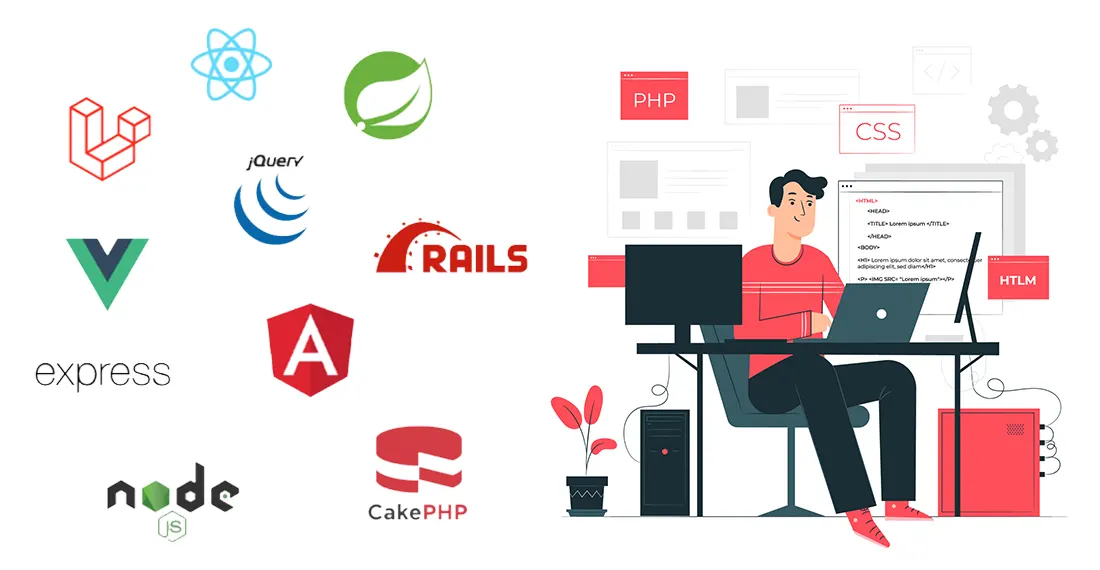
1. Understand Your Project’s Specific Requirements
Start by defining what your project needs. Identify the key skills, tools, and technologies required—whether it’s front-end development, back-end programming, or expertise in a specific framework. A clear understanding of your requirements will help you focus your search.
2. Look for Adaptability and Versatility
Beyond technical expertise, a great developer can adapt to changing requirements and unexpected challenges. Prioritize candidates who show a willingness to learn, think creatively, and solve problems efficiently.
3. Prioritize Industry-Specific Experience
For projects in specialized fields like healthcare, finance, or e-commerce, developers with industry-specific experience can provide valuable insights. Their familiarity with industry challenges ensures they can deliver solutions tailored to your business needs.
4. Assess Problem-Solving Skills
Development projects often come with unforeseen roadblocks. A strong developer should be able to analyze issues and find effective solutions. During the interview, present real-world scenarios to evaluate their problem-solving approach.
5. Ensure They Understand Your Vision
A developer should do more than just write code—they should grasp your project’s objectives and end goals. During the hiring process, ask candidates how they would approach your project’s challenges and deliver value to users. Their response will indicate how well they align with your vision.
By evaluating both technical skills and interpersonal qualities, you can find a developer who not only meets your project’s requirements but also contributes to its long-term success.
Hiring Model & their Costs
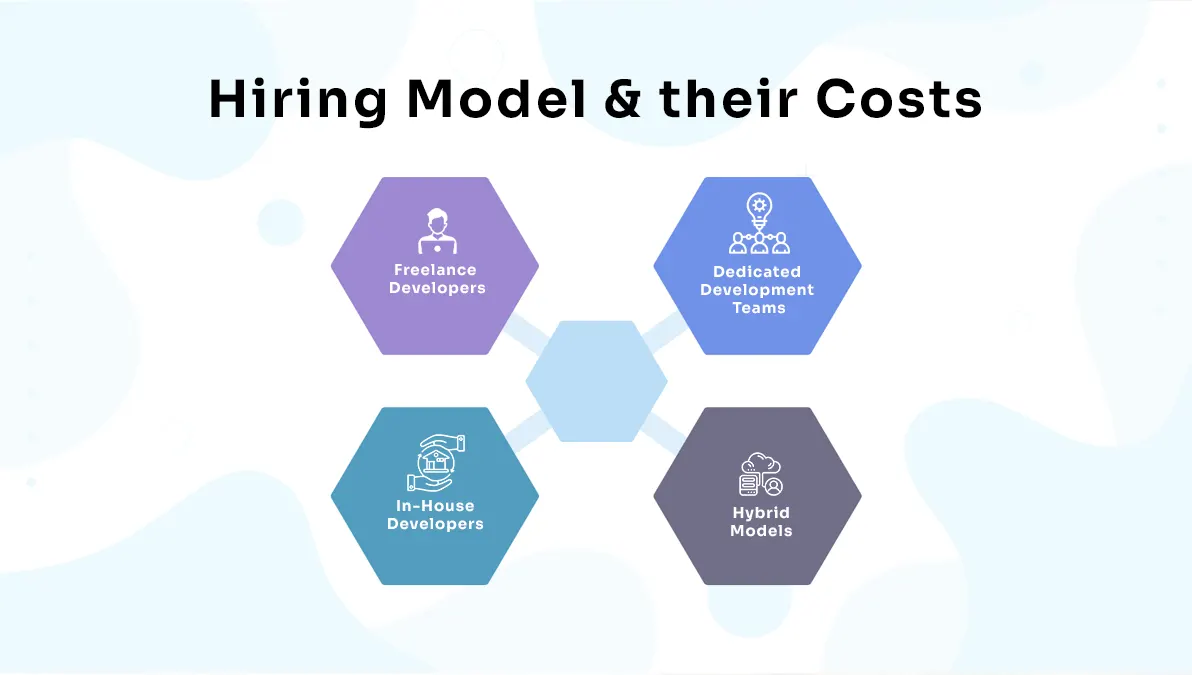
When it comes to hiring developers, choosing the right hiring model can have a significant impact on both the success of your project and your overall budget. Each model offers its own set of advantages, and understanding these can help you make an informed decision that aligns with your needs. Here’s a breakdown of some of the most popular hiring models, their costs, advantages, and considerations:
1. Freelance Developers
Freelancers are independent contractors who work on a project or hourly basis. This model is ideal for short-term projects or specific tasks that require specialized expertise.
2. Dedicated Development Teams
This model involves hiring a full team of developers who work exclusively on your project. It’s best for medium to large-scale projects requiring ongoing effort and collaboration.
3. In-House Developers
In-house developers are full-time employees who work directly for your company. This model is best for businesses with ongoing development needs and a desire for complete control over projects.
4. Project-Based Outsourcing
With project-based outsourcing, you hire an external agency or development firm to complete a specific project. The agency manages the entire process, making it a hassle-free option for businesses.
5. Staff Augmentation
Staff augmentation involves hiring remote developers to extend your team temporarily, typically during periods of high demand.
6. Hybrid Models
Hybrid models combine multiple hiring strategies, such as employing an in-house team while outsourcing certain tasks to freelancers or agencies. This approach allows for cost optimization while maintaining control over key areas.
Selecting the right hiring model depends on factors such as your project size, timeline, budget, and management capacity. Whether you’re a startup with limited resources or an enterprise with high development demands, India offers cost-effective solutions to fit your needs.
Statistics and Trends in India’s Tech Industry
India’s tech industry is thriving, driven by a blend of skilled talent, strong government support, and increasing global demand. Here are some key statistics and trends that highlight the country’s role as a leading hub for tech talent:
1. India’s IT Workforce Strength
- India boasts a workforce of over 5 million IT professionals, making it one of the largest talent pools worldwide.
- By 2025, the number of IT professionals in India is expected to grow to nearly 7 million, as global demand for digital transformation continues to rise.
2. Cost Efficiency in Hiring Developers
- Hiring developers in India can be 60-70% more cost-effective than hiring in North America or Europe, without compromising on quality.
- The average hourly rate for Indian developers ranges from $10 to $30, which is significantly lower than the global average of $50 to $150 per hour.
3. Expertise in Emerging Technologies
- More than 40% of Indian developers specialize in advanced technologies such as AI, machine learning, blockchain, and cloud computing.
- India produces over 1.5 million engineering graduates every year, many of whom focus on high-demand programming languages like Python, Java, and JavaScript.
4. Time Zone Advantage and Outsourcing
- Around 70% of global companies outsource IT services to India, benefiting from its time zone advantage, which allows for 24/7 operations and quicker project delivery.
- In 2023, Indian developers contributed $194 billion in IT exports, solidifying the country’s role as a major global outsourcing hub.
5. Startups and Freelance Growth
- India is home to the third-largest startup ecosystem in the world, with over 91,000 startups (as of 2025). This has created ample opportunities for freelance and contract-based developers.
- Freelance platforms report that India accounts for nearly 50% of global freelance software development work, thanks to its competitive rates and talent quality.
6. Government Initiatives Supporting Tech Growth
- Initiatives like Digital India, Make in India, and the establishment of tech hubs in cities such as Bangalore, Hyderabad, and Pune are boosting India’s tech ecosystem.
- These programs have resulted in the creation of over 1 million new IT jobs in the past five years alone.
7. English Proficiency Among Developers
- India ranks #2 globally for the number of English-speaking IT professionals, making it easier for international businesses to collaborate with Indian developers.
8. High Retention in the Indian IT Workforce
- Despite concerns about job-hopping, 80% of Indian developers prioritize long-term projects and professional growth, ensuring stability for employers who invest in them.
9. Increasing Adoption of AI and Automation
- More than 50% of Indian developers are currently training in AI and automation technologies to meet the growing demand for AI-driven solutions.
- Indian developers are expected to play a key role in the global AI market, which is projected to reach $1.8 trillion by 2030.
These trends and statistics underscore India’s ongoing dominance in the IT and software development sectors. Businesses looking to hire developers from India will benefit from its vast talent pool, cost advantages, and expertise in emerging technologies.
Legal and Contractual Considerations for Hiring Indian Developers
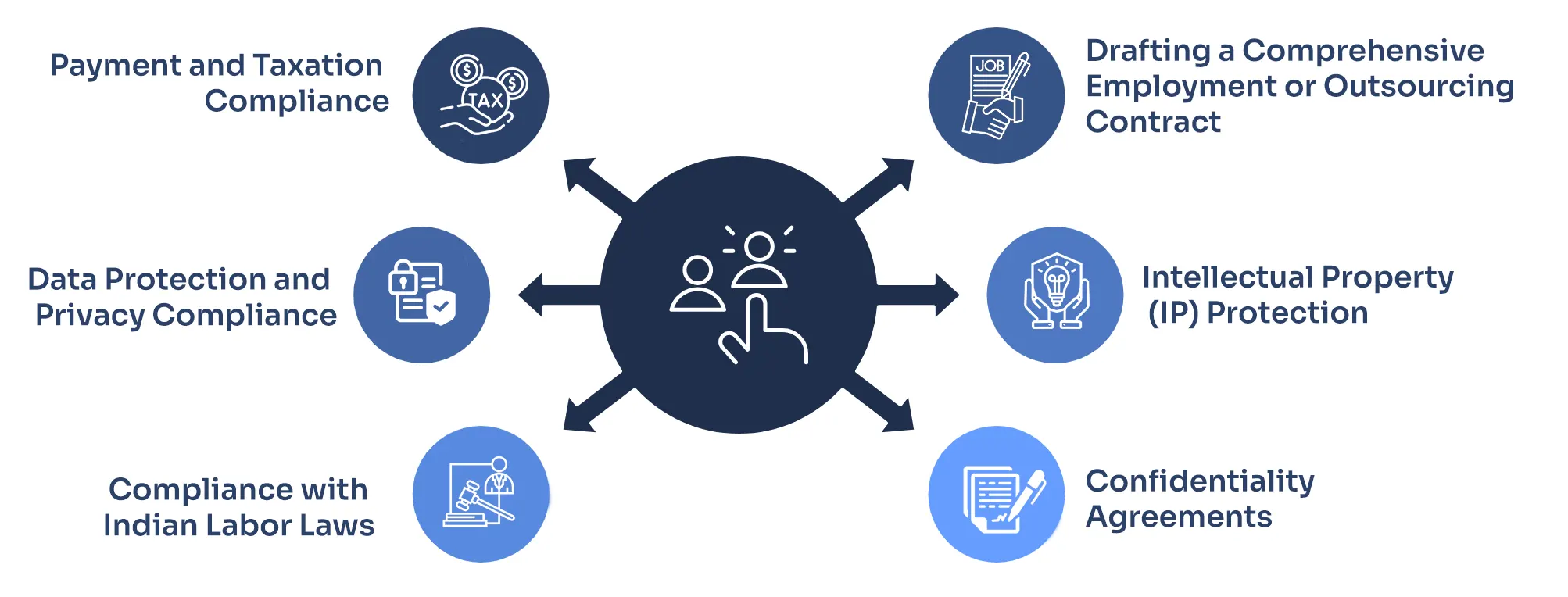
When hiring developers from India, it’s essential to understand the legal and contractual landscape to protect your intellectual property, ensure compliance with local laws, and establish clear expectations. Here are some key points to keep in mind:
1. Drafting a Comprehensive Employment or Outsourcing Contract
- It’s important to clearly outline the terms of employment or outsourcing, including:
- Scope of work
- Project deliverables
- Timelines and milestones
- Payment terms (whether hourly, monthly, or milestone-based)
- Make sure to specify dispute resolution mechanisms in case of conflicts, such as arbitration clauses.
- Include termination clauses that detail the conditions under which the agreement can be ended.
2. Intellectual Property (IP) Protection
- Ensure the contract includes a strong Intellectual Property Rights (IPR) clause to make it clear that all work products, code, and deliverables are owned by your business.
- Consider implementing a Work-for-Hire Agreement, where the developer waives any ownership claims to the work they produce for your project.
- Specify the transfer of all IP rights once the project is completed and payment is fully made.
3. Confidentiality Agreements
- To protect sensitive business information, include a Non-Disclosure Agreement (NDA) in your contract.
- Clearly define what constitutes confidential information, how it will be handled, and the consequences if there’s a breach.
- Extend the confidentiality obligation beyond the duration of the contract, ensuring ongoing protection.
4. Compliance with Indian Labor Laws
- If you’re hiring full-time developers in India, make sure you comply with Indian labor laws, such as:
- The Payment of Wages Act, 1936
- The Employee Provident Fund and Miscellaneous Provisions Act, 1952 (if applicable)
- Local state employment rules and regulations
- For independent contractors or freelancers, confirm their self-employed status to avoid misclassification issues.
5. Data Protection and Privacy Compliance
- India’s Digital Personal Data Protection Act (DPDP), 2023 governs the handling of personal data. Ensure that your hiring practices and data-sharing align with this law.
- If you’re a global company, include clauses that comply with international data protection laws like GDPR, especially if you have clients based in the EU.
6. Payment and Taxation Compliance
- Clearly define payment methods (e.g., bank transfers, PayPal, or other international platforms) and the currency in your contract.
- Understand the Indian tax implications, such as:
- Tax Deducted at Source (TDS): Some payments may require tax withholding under Indian tax laws.
- Goods and Services Tax (GST): Ensure compliance if you’re working with Indian freelancers or agencies that are GST-registered.
- It may be wise to consult a tax expert to ensure smooth financial transactions.
By addressing these legal and contractual considerations, you can minimize risks, build trust, and establish clear, transparent relationships with Indian developers. This ensures smooth project execution and contributes to long-term success
Cultural Nuances to Keep in Mind
Understanding cultural nuances can significantly enhance your working relationship with Indian developers. India’s diverse and dynamic cultural backdrop influences work ethics, communication styles, and collaboration. Here are key cultural aspects to consider:
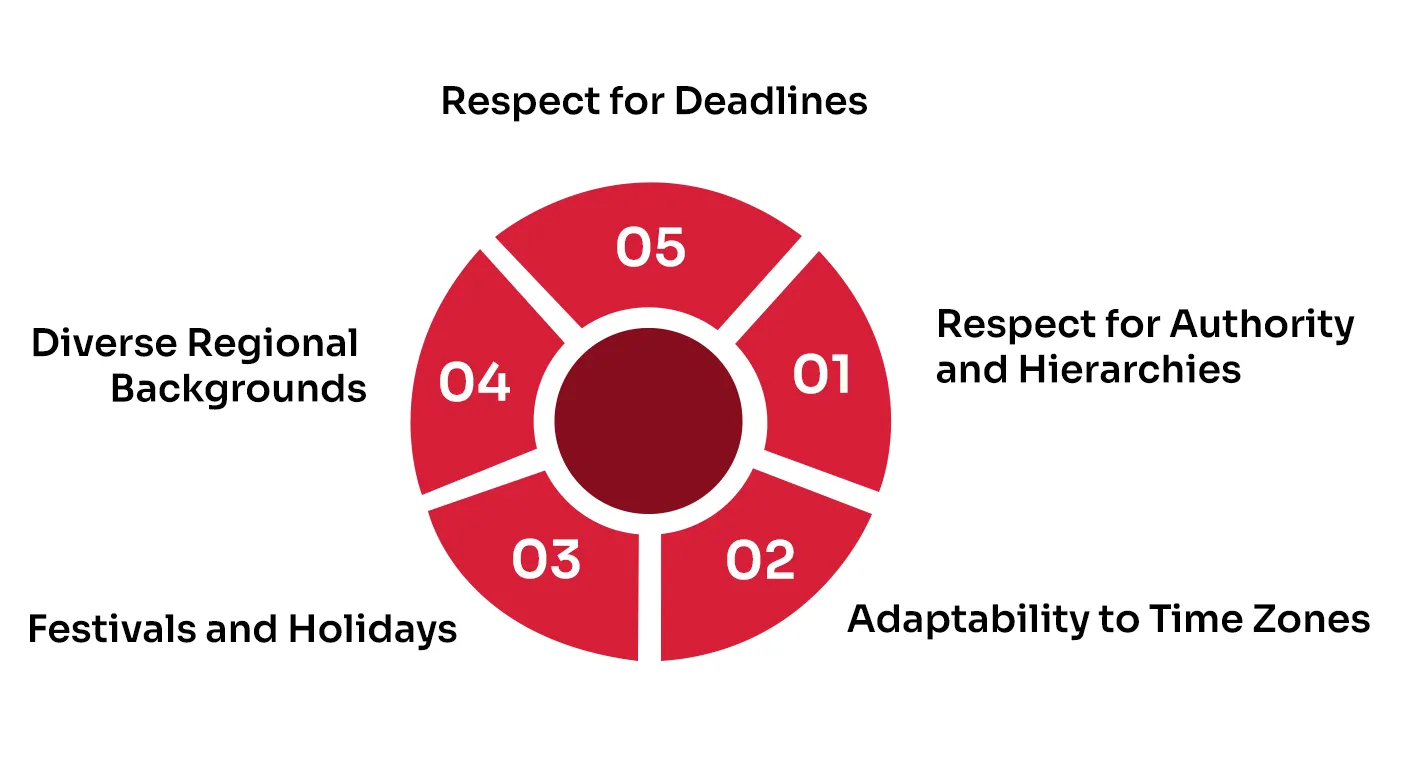
1. Respect for Authority and Hierarchies
- Indian workplace culture often values hierarchy and respect for authority. Developers may initially hesitate to voice differing opinions or challenge decisions from senior management.
- Encourage open communication and assure developers that their input is valued, fostering a collaborative environment.
2.Adaptability to Time Zones
- Indian developers are highly adaptable to different time zones, often working flexible hours to accommodate global clients.
- Be respectful of their working hours and avoid unrealistic expectations for round-the-clock availability.
3.Festivals and Holidays
- India has a rich tradition of festivals celebrated across regions, such as Diwali, Holi, and Eid. These events are significant, and developers may request time off during these periods.
- Plan project timelines with these holidays in mind and accommodate their cultural commitments.
4.Diverse Regional Backgrounds
- India’s developers come from varied linguistic and cultural backgrounds, which may influence their communication styles and preferences.
- While English is widely spoken, being mindful of accents and regional differences can help foster smoother interactions.
5.Respect for Deadlines
- While Indian developers strive to meet deadlines, unforeseen challenges may occasionally cause delays.
- Maintain open communication about project timelines and provide support if challenges arise, fostering mutual accountability.
By embracing these cultural nuances, you can build a stronger, more productive relationship with Indian developers, ensuring effective collaboration and project success. Showing sensitivity to cultural dynamics demonstrates respect and strengthens trust, ultimately enhancing the overall work experience.
Case Study
- React Projects : Tecdemy
- Node Js Projects : My Atlas connect
- WordPress Projects : Pathways to parent Hood
Conclusion: Ready to Hire Your Dream Team?
Hiring developers in India isn’t just a cost-saving move—it’s a strategic decision that can transform your business. By understanding the market, addressing challenges, and following best practices, you can build a team that’s not only skilled but also aligned with your goals.
So, what are you waiting for? Start by defining your project needs and exploring the hiring models that work best for you. And if you found this guide helpful, don’t forget to share it with your network. After all, great talent is worth spreading the word about!



